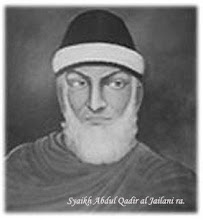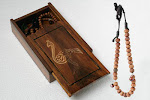Story 5
Several travellers were on a journey together and equally sharing each other’s troubles and comforts. I desired to accompany them but they would not agree. Then I said: ‘It is foreign to the manners of great men to turn away the face from the company of the poor and so deprive themselves of the advantage they might derive therefrom because I for one consider myself sufficiently strong and energetic to be of service to men and not an encumbrance. Although I am not riding on a beast, I shall aid you in carrying blankets.’ One of them said: ‘Do not be grieved at the words thou hast heard because some days ago a thief in the guise of a dervish arrived and joined our company.’
How can people know who is in the dress? The writer is aware what the book contains. As the state of dervishes is safe, they entertained no suspicion about him and received him as a friend. The outward state of Arifs is the patched dress. It suffices as a display to the face of the people. Strive by thy acts to be good and wear anything thou listest.
Place a crown on thy head and a flag on thy back. The abandoning of the world, of lust, and of desire Is sanctity, not the abandonment of the robe only. It is necessary to show manhood in the fight. Of what profit are weapons of war to an hermaphrodite?
We travelled one day till the night set in during which we slept near a fort and the graceless thief, taking up the water-pot of a companion, pretending to go for an ablution, departed for plunder.
A pretended saint who wears the dervish garb Has made of the Ka’bah’s robes the covering of an ass. After disappearing from the sight of the dervishes, he went to a tower from which he stole a casket and, when the day dawned, the dark-hearted wretch had already progressed a considerable distance. In the morning the guiltless sleeping companions were all taken to the fort
and thrown into prison. From that date we renounced companionship and took the road of solitude, according to the maxim: Safety is in solitude. When one of a tribe has done a foolish thing No honour is left either to the low or the high.
and thrown into prison. From that date we renounced companionship and took the road of solitude, according to the maxim: Safety is in solitude. When one of a tribe has done a foolish thing No honour is left either to the low or the high.
Seest thou not how one ox of the pasturage Defiles all oxen of the village?
I replied: ‘Thanks be to the God of majesty and glory, I have not been excluded from the advantages enjoyed by dervishes, although I have separated myself from their society. I have profited by what thou hast narrated to me and this admonition will be of use through life to persons like me.’
I replied: ‘Thanks be to the God of majesty and glory, I have not been excluded from the advantages enjoyed by dervishes, although I have separated myself from their society. I have profited by what thou hast narrated to me and this admonition will be of use through life to persons like me.’
For one rude fellow in the assembly The heart of intelligent men is much grieved. If a tank be filled with rose-water A dog falling into it pollutes the whole.
Story 6
A hermit, being the guest of a padshah, ate less than he wished when sitting at dinner and when he rose for prayers he prolonged them more than was his wont in order to enhance the opinion entertained by the padshah of his piety.
O Arab of the desert, I fear thou wilt not reach the Ka’bah
Because the road on which thou travellest leads to Turkestan.
When he returned to his own house, he desired the table to be laid out for eating. He had an intelligent son who said: ‘Father, hast thou not eaten anything at the repast of the sultan?’ He replied: ‘I have not eaten anything to serve a purpose.’
When he returned to his own house, he desired the table to be laid out for eating. He had an intelligent son who said: ‘Father, hast thou not eaten anything at the repast of the sultan?’ He replied: ‘I have not eaten anything to serve a purpose.’
The boy said: ‘Then likewise say thy prayers again as thou hast not done anything to serve that purpose.’
O thou who showest virtues on the palms of the hand But concealest thy errors under the armpit
What wilt thou purchase, O vain-glorious fool, On the day of distress with counterfeit silver?
O thou who showest virtues on the palms of the hand But concealest thy errors under the armpit
What wilt thou purchase, O vain-glorious fool, On the day of distress with counterfeit silver?
Story 7
I remember, being in my childhood pious, rising in the night, addicted to devotion and abstinence. One night I was sitting with my father, remaining awake and holding the beloved Quran in my lap, whilst the people around us were asleep. I said: ‘Not one of these persons lifts up his head or makes a genuflection. They are as fast asleep as if they were dead.’ He replied:
‘Darling of thy father, would that thou wert also asleep rather than disparaging people.’
The pretender sees no one but himself Because he has the veil of conceit in front.
If he were endowed with a God-discerning eye He would see that no one is weaker than himself.
I remember, being in my childhood pious, rising in the night, addicted to devotion and abstinence. One night I was sitting with my father, remaining awake and holding the beloved Quran in my lap, whilst the people around us were asleep. I said: ‘Not one of these persons lifts up his head or makes a genuflection. They are as fast asleep as if they were dead.’ He replied:
‘Darling of thy father, would that thou wert also asleep rather than disparaging people.’
The pretender sees no one but himself Because he has the veil of conceit in front.
If he were endowed with a God-discerning eye He would see that no one is weaker than himself.
Story 8
A great man was praised in an assembly and, his good qualities being extolled, he raised his head and said: ‘I am such as I know myself to be.’
O thou who reckonest my virtues, refrainest from giving me pain,
These are my open, and thou knowest not my hidden, qualities.
My person is, to the eyes of the world, of good aspect But my internal wickedness makes me droop my head with shame.
The peacock is for his beauteous colours by the people
Praised whilst he is ashamed of his ugly feet.
A great man was praised in an assembly and, his good qualities being extolled, he raised his head and said: ‘I am such as I know myself to be.’
O thou who reckonest my virtues, refrainest from giving me pain,
These are my open, and thou knowest not my hidden, qualities.
My person is, to the eyes of the world, of good aspect But my internal wickedness makes me droop my head with shame.
The peacock is for his beauteous colours by the people
Praised whilst he is ashamed of his ugly feet.
(From "Gullistan" - The Book Of Shaykh Sa'di as Shirazi)










No comments:
Post a Comment